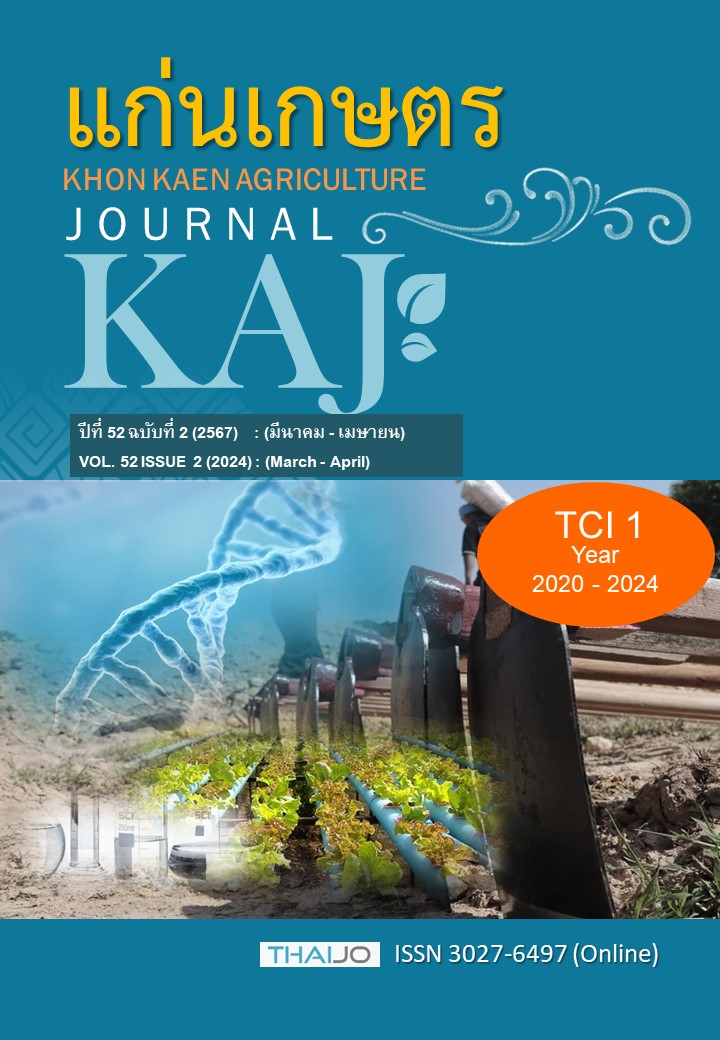Expectations in deciding to participate in the Large Collaborative Farming Project (LCFP) of oil palm farmers in Narathiwat Province
Main Article Content
Abstract
This study aimed to find out 1) the economic situation and oil palm production data, 2) expectations before deciding to participate in the Large Collaborative Farming Project (LCFP), and 3) factors that affect expectations in deciding to participate in the LCFP of oil palm farmers in Narathiwat province. The number of 263 farmers participating in LCFP in Narathiwat province was selected as a sample group used in this study. The questionnaire was used as a tool for data collection. Descriptive statistics and inferential statistics were used for data analysis. The results of this study indicated that farmers had averages of experience in oil palm production for 10.29 years with oil palm planting areas for 12.20 rai/household, respectively. Household laborers were mostly used. The biggest problem found in oil palm productivity before participating in LCFP was the high production cost. 98.9% of farmers acknowledged LCFP news through personal media which were agricultural extensionists. The cost reduction was the expectation that farmers used in deciding to participate in LCFP rated at a high level (average value at 3.42). After farmers had participated in LCFP, the study found that incomes earned from selling the oil palm productivity increased by 1,856.84 baht/rai/year with a cost reduction of 443.52 baht/rai/year and more production by 271.67 kg/rai/year. More farmers received good agricultural practices (GAP) by 57.4%. The study also found that factors related to planting oil palm experience with quality development, size of oil palm planting area with cost reduction, and size of oil palm area participated in LCFP with quality development had positive correlations. However, the total household expenditures with quality development had a negative correlation with statistical significance at level P<0.05.
Article Details

This work is licensed under a Creative Commons Attribution-NonCommercial-NoDerivatives 4.0 International License.
References
กรมส่งเสริมการเกษตร. 2559. คู่มือการดำเนินงานการส่งเสริมเกษตรแปลงใหญ่ ปีงบประมาณ 2559. กรมส่งเสริมการเกษตร กระทรวงเกษตรและสหกรณ์.
กรมส่งเสริมการเกษตร. 2565. ระบบส่งเสริมการเกษตรแปลงใหญ่. แหล่งข้อมูล: https:// co-farm.doae.go.th. ค้นเมื่อ 18 ธันวาคม 2565.
ฉวีวรรณ เจริญผ่อง, ชลาธร จูเจริญ และสุภาภรณ์ เลิศศิริ. 2565. ปัจจัยการตัดสินใจเข้าร่วมเกษตรแปลงใหญ่โกโก้ของเกษตรกรในอำเภอวังเหนือ จังหวัดลำปาง. แก่นเกษตร. 50: 710-718.
รวิฐา ทวีพร้อม, พงศ์ภัทร เกียรติประเสริฐ, แก้วตา บุญร่วม, รุ่งทิพย์ เกษตรสิงห์ และสุเนตรา ทองจันทร์. 2565. แนวทางการบริหารจัดการเพื่อเพิ่มมูลค่าสินค้าเกษตรในระบบเกษตรแปลงใหญ่แถบภาคอีสานใต้ตอนล่าง. สันติศึกษาปริทรรศน์ มจร. 4: 1483-1494.
สำนักงานเกษตรจังหวัดนราธิวาส. 2564. สรุปโครงการเกษตรแปลงใหญ่ปาล์มน้ำมันจังหวัดนราธิวาส. จังหวัดนราธิวาส.
สำนักงานเศรษฐกิจการเกษตร. 2564. ปาล์มน้ำมันปี 2564. แหล่งข้อมูล: https://mis-app.oae.go.th/product/. ค้นเมื่อ 10 กุมภาพันธ์ 2566.
สำนักงานสถิติจังหวัดนราธิวาส. 2561. สถานการณ์การปลูกปาล์มน้ำมันจังหวัดนราธิวาส. แหล่งข้อมูล: http://narathiwat.nso.go.th/index.php?option=com_content&view. ค้นเมื่อ 20 กุมภาพันธ์ 2566.
สินีนาฏ จำนงค์, พัชราวดี ศรีบุญเรือง และชลาธร จูเจริญ. 2563. ปัจจัยที่มีผลต่อความสำเร็จในการดำเนินงานวิสาหกิจชุมชนปาล์มน้ำมันตามมาตรฐานการผลิตปาล์มน้ำมันอย่างยั่งยืน อำเภอสิเกา จังหวัดตรัง. เกษตรพระจอมเกล้า. 38: 408-416.
สุดารัตน์ แช่มเงิน. 2559. ปัจจัยที่มีผลต่อความสำเร็จของวิสาหกิจชุมชนไวน์ศรีชุมแสงตำบลท่าไม้รวก อำเภอท่ายาง จังหวัดเพชรบุรี. วิทยานิพนธ์ วิทยาศาสตร์บัณฑิต สาขาส่งเสริมการเกษตร มหาวิทยาลัยเกษตรศาสตร์.
ศูนย์วิจัยเศรษฐกิจพืชไร่นา. 2560. อุตสาหกรรมปาล์มน้ำมันในยุคประชาคมเศรษฐกิจอาเซียน.แหล่งข้อมูล: www.arda.or.th/easyknowledge/easy-articlesdetail. ค้นเมื่อ 12 กุมภาพันธ์ 2566.
Ajayi, M. T., and O. Solomon. 2010. Influence of extension contact and Farmers’ Socio-economic characteristics on adoption of oil palm technologies in Aniocha North Local Government, Delta State, Nigeria. Journal of Agriculture Science and Technology, 12: 35-46.
Alwarritzi, W., T. Nanseki, and Y. Chomei. 2015. Analysis of the factors influencing the technical efficiency among oil palm smallholder farmers in Indonesia. Procedia Environmental Sciences. 28: 630-638.
Arga, R., F. Ahmed, and S. Thongrak. 2021. The impact of oil palm farming on househosehold income and expenditure in indonesia. Journal of Asian Finance, Economics and Business. 8: 539–547.
Buapan, P., N. Sohheng, and N. Boonlue. 2018. The implementation of the extension policy on agricutural land plot support system of paddy field in chachoengsao province in the fiscal year 2016. VRU Research and Development Journal Humanities and Social Science. 13: 86-98.
Rist, L., Laure`ne Feintrenie, and P. Levang. 2010. The livelihood impacts of oil palm: smallholders in Indonesia. Biodiversity and Conservation. 19: 1009-1024.
Thirapong, K. 2017. The large agricutural land plot program and the context of Thailand’s Agriculture. Proceedings of the conference on the faculty of economics (pp.49-64). Bangkok: Ramkhamhaeng University.
Thongdeerawisuraket, P. 2019. Factors encouraging the participation of famers converting agricultural land in Kanchanaburi. Journal of Kanchanaburi Rajabhat University. 8: 107-119.
Yamane, T. 1967. Statistics, An Introductory Analysis, 2ndEd., New York: Harper and Row.


